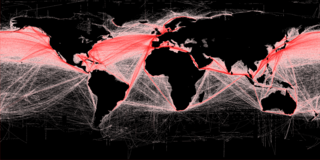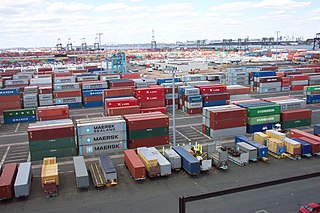Related Research Articles

Freight transport, also referred as freight forwarding, is the physical process of transporting commodities and merchandise goods and cargo. The term shipping originally referred to transport by sea but in American English, it has been extended to refer to transport by land or air as well. "Logistics", a term borrowed from the military environment, is also used in the same sense.

Containerization is a system of intermodal freight transport using intermodal containers. Containerization, also referred as container stuffing or container loading, is the process of unitization of cargoes in exports. Containerization is the predominant form of unitization of export cargoes, as opposed to other systems such as the barge system or palletization. The containers have standardized dimensions. They can be loaded and unloaded, stacked, transported efficiently over long distances, and transferred from one mode of transport to another—container ships, rail transport flatcars, and semi-trailer trucks—without being opened. The handling system is mechanized so that all handling is done with cranes and special forklift trucks. All containers are numbered and tracked using computerized systems.

In transportation, freight refers to goods conveyed by land, water or air, while cargo refers specifically to freight when conveyed via water or air. In economics, freight refers to goods transported at a freight rate for commercial gain. The term cargo is also used in case of goods in the cold-chain, because the perishable inventory is always in transit towards a final end-use, even when it is held in cold storage or other similar climate-controlled facilities, including warehouses.

Cross-docking is a logistical practice of Just-In-Time Scheduling where materials are delivered directly from a manufacturer or a mode of transportation to a customer or another mode of transportation. Cross-docking often aims to minimize overheads related to storing goods between shipments or while awaiting a customer's order. This may be done to change the type of conveyance, to sort material intended for different destinations, or to combine material from different origins into transport vehicles with the same or similar destinations.

CMA CGM is a French shipping and logistics company founded in 1978 by Jacques Saadé.

Rail freight transport is the use of railways and trains to transport cargo as opposed to human passengers.
Truckload shipping is freight transport in which a semi-trailer or intermodal container is filled entirely with one type of cargo. It differs from less-than-truckload shipping (LTL) in which freight from multiple customers is combined in one trailer. A truckload carrier is a trucking company that contracts entire trailer-load to a single customer.

A freight rate is a price at which a certain cargo is delivered from one point to another. The price depends on the form of the cargo, the mode of transport, the weight of the cargo, and the distance to the delivery destination. Many shipping services, especially air carriers, use dimensional weight for calculating the price, which takes into account both weight and volume of the cargo.

Less-than-truckload shipping or less than load (LTL) is the transportation of an amount of freight sized between individual parcels and full truckloads. Parcel carriers handle small packages and freight that can be broken down into units less than approximately 150 pounds (68 kg). Full truckload carriers move entire semi-trailers. Semi-trailers are typically between 26 and 53 feet and require a substantial amount of freight to make such transportation economical. The term LTL can refer to the freight itself, or to the carrier that transports the such freight.
A freight forwarder or forwarding agent is a person or a company who co-ordinates and organizes the movement of shipments on behalf of a shipper by liaising with carriers. The carriers may use a variety of shipping modes, including ships, airplanes, trucks, and railroads, and often use multiple modes for a single shipment. A freight forwarder does not move the goods but acts as an agent in the logistics network and will carry out freight consolidation, rate negotiations, shipment tracking, customs and other documentation, among other tasks. FIATA describes a freight forwarder as the "Architect of transport".

C.H. Robinson Worldwide, Inc. is an American transportation company that includes third-party logistics (3PL). The company offers freight transportation, transportation management, brokerage and warehousing. It offers truckload, less than truckload, air freight, intermodal, and ocean transportation.

Freight companies are companies that specialize in the moving of freight, or cargo, from one place to another. These companies are divided into several variant sections. For example, international freight forwarders ship goods internationally from country to country, and domestic freight forwarders, ship goods within a single country.

Drayage is the transportation of shipping containers by truck to its final destination. Drayage is often part of a longer overall move, such as from a ship to a warehouse. Some research defines it specifically as "a truck pickup from or delivery to a seaport, border point, inland port, or intermodal terminal with both the trip origin and destination in the same urban area". Port drayage is the term used when describing short hauls from ports and other areas to nearby locations. It can also refer to the movement of goods within large buildings such as convention centers. Drayage is a key aspect of the transfer of shipments to and from other means of transportation. The term drayage is also used for the fee paid for such services.
Freightquote, a C.H. Robinson company, is an online transportation broker of freight services throughout North America, based in Kansas City, Missouri. Their business provides comparisons of shipping rates for national and regional freight carriers.
Trailer Bridge, Inc. is a freight service company headquartered in Jacksonville, Florida. They offer international and domestic shipping with primary international calls to San Juan, Puerto Rico and Puerto Plata, Dominican Republic.

Freightos operates a booking and payments platform for international freight, using a SaaS-Enabled Marketplace model. It also provides rate management and quoting software for freight forwarders and carriers through WebCargo, a subsidiary acquired in 2016
Flexport Inc. is an American multinational corporation that focuses on supply chain management and logistics, including order management, delivery, trade financing, insurance, freight forwarding, and customs brokerage. The company is headquartered in San Francisco, California, has thousands of employees and annual revenues of more than $3.3 billion.

APL Logistics Ltd. (APLL) is a wholly owned subsidiary of Kintetsu World Express, Inc. (KWE), a Japan-based freight forwarding and transportation company. As a global supply chain specialist, APL Logistics trades in more than 60 countries, serving the automotive, consumer, industrials, and retail verticals. Headquartered in Singapore and USA, APL Logistics has locations across the globe.
Haven Inc. is a company that automates logistics for ocean freight companies. Based in Singapore, San Francisco and Basel, it manages a freight rate and logistics for large international supply chains. Haven is considered one of the pioneers of the digital revolution in shipping logistics.
A smart port equips the workforce with relevant skills and technology to solve the unique internal and external challenges of the organisation, and to facilitate the efficient movement of goods, delivery of services and smooth flow of information.
References
- 1 2 "FreightTech investment surges in 2019". FreightWaves. 2019-04-16. Retrieved 2019-12-10.
- ↑ "The Rise of FreightTech" (PDF). MercerCapital.com. Archived from the original (PDF) on 2019-12-10. Retrieved 2019-10-01.
- ↑ "Freight Tech VC on Track to Top 2018's Record $3.6 billion". Trucks.com. 2019-04-29. Retrieved 2019-12-10.
- 1 2 3 "Maersk, IBM say 94 organizations have joined blockchain trade platform". Reuters. 2018-08-09. Retrieved 2019-12-10.
- 1 2 "White Paper - The New Economics of Freight Brokerage". FreightWaves. 2019-08-20. Retrieved 2019-12-10.
- 1 2 3 4 "Modernizing the Shipping Industry". Stanford eCorner. Retrieved 2019-12-10.
- 1 2 3 4 5 "IBM-Maersk blockchain shipping consortium expands to include other major shipping companies". TechCrunch. 28 May 2019. Retrieved 2019-12-10.
- ↑ "The hidden opportunity in container shipping | McKinsey". mckinsey.com. Retrieved 2019-12-10.
- 1 2 3 4 5 "The Freight Technology Story - III. Intelligent Freight Technology Benefits - FHWA Freight Management and Operations". Federal Highway Administration (FHWA) . Retrieved 2019-12-10.
- ↑ Charland, Anthony. "What Is an API and How Do They Streamline Freight and Logistics?". re-transfreight.com. Retrieved 2019-12-10.
- 1 2 3 4 "Blockchain in Logistics" (PDF). www.logistics.dhl. Retrieved 2019-10-01.
- 1 2 3 "IoT powered by Blockchain: How Blockchains facilitate the application of digital twins in IoT" (PDF). Deloitte.com. Retrieved 2019-10-01.
- 1 2 3 "Resolving the Blockchain Paradox in Transportation and Logistics". www.bcg.com. Retrieved 2019-12-10.
- ↑ Castellanos, Sara (29 April 2019). "FedEx CIO Looks to Industry Collaboration to Scale Blockchain". Wall Street Journal. Retrieved 2019-12-10.
- 1 2 "Uber is trying to disrupt the road-freight business". The Economist. 2019-05-16. ISSN 0013-0613 . Retrieved 2019-12-10.
- ↑ "Digital platforms in freight transportation". Arthur D Little. 2017-10-08. Retrieved 2019-12-10.
- ↑ Munoz, Jan Claudio (2019-05-21). "Freight Exchanges, Digital Freight Forwarders, Forwarding SaaS". Medium. Retrieved 2019-12-10.
- 1 2 "To Get Smart, Ports Go Digital". www.bcg.com. Retrieved 2019-12-10.
- ↑ "Technology and the Future of Freight Brokerage" (PDF). Freightwaves.com. Retrieved 2019-09-29.
- ↑ "Key Technologies for Efficient Logistic Operations | SIPMM Publications". publication.sipmm.edu.sg. 18 December 2021. Retrieved 2022-03-20.
- 1 2 3 Wyman, Oliver. "Disruption: The Future Of Rail Freight". oliverwyman.com. Retrieved 2019-12-10.
- 1 2 "New Technology and Automation in Freight Transport and Handling Systems" (PDF). gov.uk. Retrieved 2019-10-16.
- ↑ Baxter, Glenn; Kourousis, Kyriakos (2015-04-22). "Temperature Controlled Aircraft Unit Load Devices: The Technological Response to Growing Global Air Cargo Cool Chain Requirements". Journal of Technology Management & Innovation. 10 (1): 157–172. doi: 10.4067/S0718-27242015000100012 . ISSN 0718-2724.
- 1 2 "CCN and Microsoft launch air cargo blockchain first". Air Cargo News. 2019-03-15. Retrieved 2019-12-10.
- 1 2 "Blockchain in air cargo: digital disruption in the supply chain". IBM.com. Retrieved 2019-09-29.
- ↑ Muir, James (2019-03-13). "IATA WCS 2019: Blockchain comes to air cargo billing". AIR CARGO WEEK. Retrieved 2019-12-10.
- 1 2 "Rail Freight Strategy" (PDF). gov.uk.dft. Retrieved 2019-10-16.
- ↑ "Connected freight trains are better freight trains". Bosch Media Service. Archived from the original on 2019-12-10. Retrieved 2019-12-10.
- ↑ "Autonomous Trains Are Ready to Roll, but May Face Challenges Gaining Acceptance". Fortune. Retrieved 2019-12-10.
- ↑ "Rise of the machines: Rio Tinto breaks new ground with AutoHaul". International Railway Journal. Retrieved 2019-12-10.
- ↑ Paris, Costas (28 May 2019). "Big Ocean Cargo Carriers Join Blockchain Initiative". Wall Street Journal. Retrieved 2019-12-10.
- ↑ "IBM Tech Trends To Watch In 2020 … And Beyond". Forbes . 2019-12-09. Retrieved 2019-12-10.
- 1 2 3 Rodrigue, Jean-Paul (2018-10-17). "Efficiency and Sustainability in Multimodal Supply Chains" (PDF). International Transport Forum. Retrieved 2019-10-11.